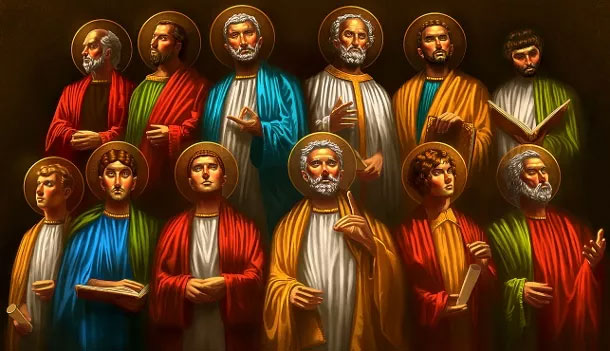Last Updated on July 13, 2023
The specific moment or event in the disciples’ lives when they became “born again” is not explicitly mentioned in the Bible. However, several instances suggest a spiritual transformation took place in their lives. One such example is when Jesus breathed on them and said, “Receive the Holy Spirit” (John 20:22). This can be seen as a symbolic representation of their spiritual rebirth. Additionally, the disciples’ experiences after Jesus’ resurrection, such as their boldness in preaching the gospel and willingness to suffer for their faith, indicate a profound change in their hearts and lives.
The Disciples’ Journey: Tracing their Spiritual Transformation
The disciples’ journey toward spiritual transformation can be traced through various events and encounters with Jesus. One significant moment in their journey was when Jesus called them to follow him. This marked the beginning of their discipleship and commitment to learning from and following Jesus.
Throughout their time with Jesus, the disciples witnessed his teachings, miracles, and how he lived his life. These experiences profoundly impacted them and gradually transformed their understanding of who Jesus was and what it meant to be his disciple.
Another pivotal moment in their journey was when Jesus asked them, “Who do you say I am?” Peter answered, “You are the Christ, the Son of the living God.” This confession of faith demonstrated their growing understanding and belief in Jesus as the Messiah.
However, it was not until after Jesus’ death and resurrection that the disciples truly experienced a spiritual rebirth. The outpouring of the Holy Spirit on Pentecost empowered them and ignited a boldness and passion for sharing the gospel.
The Role of Jesus: How He Influenced the Disciples’ Rebirth
When exploring the question of when the disciples became born again, it is crucial to understand Jesus’s role in their spiritual rebirth. Jesus, as the Son of God and the central figure of Christianity, profoundly impacted the disciples’ transformation.
The Gospels depict Jesus as a teacher, healer, and, ultimately, the Savior. His teachings and actions challenged the disciples’ beliefs and transformed their understanding of God’s kingdom. Jesus’ message of repentance, forgiveness, and salvation resonated deeply with the disciples, leading them to experience a spiritual awakening.
Furthermore, Jesus’ sacrificial death and resurrection were pivotal moments in the disciples’ journey toward being born again. His death on the cross provided the ultimate sacrifice for the forgiveness of sins, while his resurrection demonstrated his power over death and the promise of eternal life.
By witnessing Jesus’ miracles, hearing his teachings, and experiencing his love and grace firsthand, the disciples were profoundly impacted and underwent a spiritual rebirth. Jesus’ presence and influence were instrumental in transforming them into faithful followers and witnesses of his message.
Historical Accounts: Insights from Early Christian Writers
When exploring when the disciples became born again, examining insights from early Christian writers is valuable. These historical accounts provide helpful context and understanding of the disciples’ spiritual transformation. Here are some key points:
- Early Christian writers like Clement of Alexandria, Origen, and Tertullian provide accounts of the disciples’ conversion experiences.
- According to Clement of Alexandria, the disciples experienced a spiritual rebirth after Jesus’ resurrection and ascension.
- Origen suggests that the disciples’ conversion happened gradually as their understanding of Jesus’ teachings grew.
- Tertullian emphasizes the role of the Holy Spirit in the disciples’ rebirth, highlighting the importance of the disciples receiving the Spirit on the day of Pentecost.
- These historical accounts offer different perspectives on the timing and nature of the disciples’ spiritual rebirth, providing valuable insights for further exploration and interpretation.
By examining these early Christian writings, we can better understand the disciples’ conversion experiences and their significance in the early Christian movement.
Theological Perspectives: Different Interpretations of the Disciples’ Conversion
There are various theological perspectives and interpretations regarding the disciples’ conversion and spiritual rebirth. These different viewpoints offer insights into the disciples’ experiences and shed light on the significance of their transformation. Some of the theological perspectives include:
- Immediate Conversion: This perspective suggests that the disciples experienced a sudden and complete transformation at a specific moment in their relationship with Jesus. It emphasizes the instantaneous nature of their rebirth.
- Gradual Transformation: According to this viewpoint, the disciples’ conversion was a gradual process that unfolded over time. It highlights the growth and development of their faith as they walked with Jesus.
- Symbolic Rebirth: This interpretation sees the disciples’ conversion as a symbolic representation of the broader human experience of being born again. It emphasizes the universal nature of spiritual rebirth.
- Unique Experiences: Some theologians argue that each disciple had a fantastic conversion experience tailored to their personalities and circumstances. This perspective recognizes the diversity of the disciples’ spiritual journeys.
These different theological perspectives contribute to a richer understanding of the disciples’ conversion and highlight the complexity of their spiritual rebirth. They remind us there is no one-size-fits-all approach to being “born again” and that personal transformation experiences can vary.
Factors Influencing the Timing: Possible Triggers for the Disciples’ Rebirth
Several factors may have influenced the timing of the disciples’ spiritual rebirth or conversion. One possible trigger could be the teachings and actions of Jesus himself. Throughout his ministry, Jesus preached about the need for repentance and the importance of being born again. His words and actions may have sparked a desire for spiritual transformation in the hearts of the disciples.
Another factor could be the disciples’ personal experiences and encounters with Jesus. For example, when Jesus called Peter, Andrew, James, and John to be his disciples, they left everything behind to follow him. This surrender and commitment may have been pivotal in their journey toward being born again.
Additionally, the disciples may have been influenced by the presence of the Holy Spirit. In the book of Acts, we see that the disciples received the Holy Spirit on Pentecost, which empowered them to proclaim the gospel boldly. This infilling of the Holy Spirit could have catalyzed their spiritual rebirth.
Overall, the timing of the disciples’ rebirth was likely influenced by a combination of factors, including Jesus’ teachings and actions, personal experiences, and the work of the Holy Spirit in their lives.
Personal Experiences: Accounts of the Disciples’ Spiritual Awakening
While no specific moment or event is mentioned in the Bible that explicitly states when the disciples became “born again,” there are accounts of their personal experiences that shed light on their spiritual awakening. One such report is in the Gospel of Matthew, where Jesus asks his disciples, “Who do you say that I am?” Peter responds, “You are the Christ, the Son of the living God.” This confession of faith indicates a deep understanding and belief in Jesus as the Messiah, suggesting a transformative moment in Peter’s spiritual journey.
Another example is the story of the disciples’ encounter with the risen Jesus on the road to Emmaus. After Jesus explains the Scriptures to them, their hearts burn within them, and they recognize him. This encounter leads to a profound realization of Jesus’ identity and renewed faith.
These personal experiences highlight the disciples’ growing understanding and relationship with Jesus, which can be seen in the disciples’ hearts’ rebirth or conversion. It is through their encounters with Jesus and their deepening faith that the disciples experience a transformative change in their lives.
Lessons for Today: Applying the Disciples’ Transformation to Our Lives
Understanding the transformation experienced by the disciples can provide valuable lessons for our spiritual journeys. The disciples’ conversion is a powerful example of the possibility of personal growth and change through a relationship with Jesus Christ.
One lesson we can learn is the importance of surrendering ourselves to God. The disciples had to let go of their old ways of thinking and living to fully embrace their new identity as followers of Jesus. This requires humility, trust, and a willingness to let go of control.
Another lesson is the power of community and accountability. The disciples were not alone in their journey; they had each other for support and encouragement. Likewise, we can benefit from surrounding ourselves with fellow believers who can help us stay on track and grow in our faith.
The disciples’ transformation also reminds us of the need for ongoing growth and discipleship. They didn’t become perfect overnight; their journey was a process of continual learning and development. Similarly, we should continually deepen our relationship with God and seek opportunities for spiritual growth.
By applying these lessons from the disciples’ transformation to our lives, we can experience a deeper connection with God and a greater sense of purpose and fulfillment in our faith journey.
Unveiling the Profound Impact of the Disciples’ Spiritual Rebirth
The disciples’ journey, as documented in biblical references, historical accounts, and theological perspectives, reveals the profound significance of their spiritual rebirth. Through their personal experiences and encounters with Jesus Christ, the disciples underwent a transformative journey leading to their spiritual awakening.
Jesus was pivotal in influencing the disciples’ rebirth, guiding them toward a deeper understanding of their faith and purpose. Early Christian writers provided valuable insights into the disciples’ transformation, shedding light on the factors that influenced the timing of their rebirth.
By examining the disciples’ journey, we can draw valuable lessons for our own lives. Their story is a powerful reminder of the transformative power of faith and the potential for personal growth and spiritual renewal.
As we delve into being “born again,” we gain a deeper understanding of the disciples’ spiritual rebirth and its relevance to our lives today. Their journey inspires us to seek our spiritual awakening and embrace the transformative power of faith.
Frequently Asked Questions
1. What does it mean to be “born again”?
2. Are there any biblical references to the disciples being “born again”?
3. How did the disciples undergo a spiritual transformation?
4. How did Jesus influence the disciples’ rebirth?
5. Are there any historical accounts of the disciples’ rebirth?
6. Are there different theological perspectives on the disciples’ conversion?
7. What factors influenced the timing of the disciples’ rebirth?
8. Are there any personal accounts of the disciples’ spiritual awakening?
9. How can we apply the disciples’ transformation to our lives today?
10. What is the significance of the disciples’ spiritual rebirth?
About The Author

Pat Rowse is a thinker. He loves delving into Twitter to find the latest scholarly debates and then analyzing them from every possible perspective. He's an introvert who really enjoys spending time alone reading about history and influential people. Pat also has a deep love of the internet and all things digital; she considers himself an amateur internet maven. When he's not buried in a book or online, he can be found hardcore analyzing anything and everything that comes his way.

